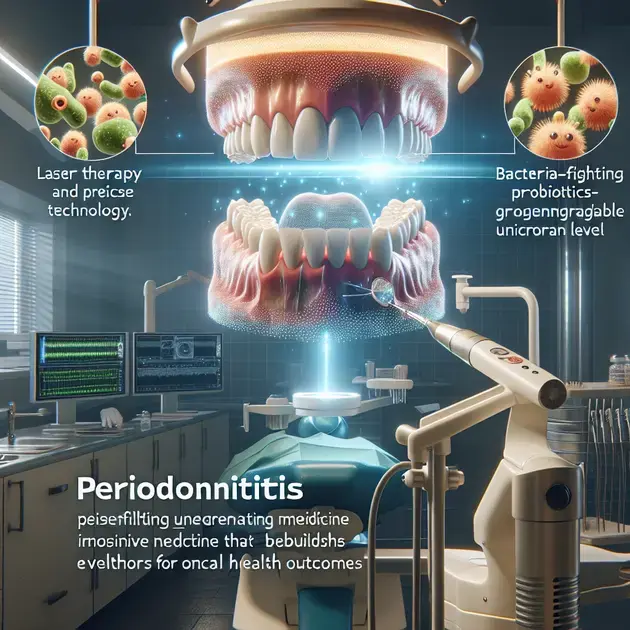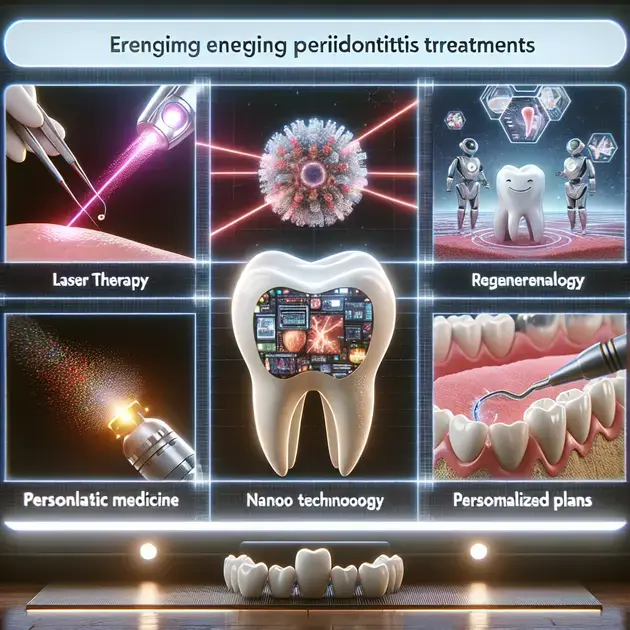Looking for the most effective medication for periodontitis? You’ve come to the right place. In this comprehensive guide, we will cover everything you need to know about treating this common but serious oral health condition.
With the latest advancements in dental research, there are now various options available for combating periodontitis. From traditional treatments to cutting-edge therapies, we will explore the most reliable and innovative approaches to managing this condition.

Effective Medication for Periodontitis: A Comprehensive Overview
Periodontitis is a serious gum infection that damages the soft tissue and destroys the bone supporting your teeth. To effectively manage and treat periodontitis, various medications are available. Here is a comprehensive overview of the most common medications used:
1. Antibiotics
Antibiotics such as doxycycline and minocycline are often prescribed to control bacterial infections in the gums. These medications can be taken orally or applied directly to the gum pockets for targeted treatment. You can find more information on antibiotic use for periodontitis on the American Dental Association website.
2. Antiseptic Mouthwashes
Antiseptic mouthwashes containing chlorhexidine are effective in reducing the amount of bacteria in the mouth and can help manage periodontal disease. Look for products like Colgate PerioGard that are specifically formulated for gum health. You can purchase these mouthwashes at most pharmacies or online.
3. Enzyme Suppressants
Enzyme suppressants like low-dose doxycycline can help reduce the body’s destructive enzymes in the gums, slowing down the progression of periodontitis. Your dentist may recommend supplements like Periostat; consult with them for more information on dosage and usage.
4. Pain Relievers
For managing discomfort associated with periodontal infections, over-the-counter pain relievers such as ibuprofen can be helpful. Always follow the recommended dosage instructions and consult with your healthcare provider if you have any concerns about medication interactions.
5. Prescription Mouth Gels
In severe cases of periodontitis, your dentist may prescribe medicated mouth gels containing antibiotics or enzymes to apply directly to the affected gum areas. These gels can aid in reducing inflammation and promoting healing. Ask your dentist about specific products like PerioChip for targeted treatment.
Understanding Periodontitis: Causes and Symptoms
Periodontitis is a common but serious gum infection caused by bacteria in plaque. Understanding the primary causes and recognizing the symptoms early can help prevent the progression of the disease. Here is an overview of the causes and symptoms of periodontitis:
1. Causes of Periodontitis
The main cause of periodontitis is poor oral hygiene leading to the buildup of plaque on the teeth. Plaque contains harmful bacteria that irritate the gums, leading to infection. Other factors such as smoking, genetic predisposition, and certain medical conditions can also contribute to the development of periodontitis. Visit the National Institute of Dental and Craniofacial Research website for more information on periodontal diseases.
2. Symptoms of Periodontitis
Common symptoms of periodontitis include red, swollen, or bleeding gums, persistent bad breath, loose teeth, and gum recession. If left untreated, periodontitis can cause tooth loss and affect overall health. It’s essential to schedule regular dental check-ups to detect and address periodontal issues early. You can track your symptoms and oral health habits using the Oral-B app, which provides tips and reminders for maintaining gum health.
3. Preventive Measures
Preventing periodontitis involves practicing good oral hygiene, including brushing your teeth twice a day, flossing daily, and visiting your dentist for regular cleanings and check-ups. Avoiding smoking and maintaining a balanced diet can also reduce the risk of developing gum disease. Use the Colgate Connect app to set oral health goals and track your progress towards healthier gums.
The Future of Periodontitis Treatment: Innovations and Breakthroughs
Advancements in dental research and technology are paving the way for innovative treatments in the field of periodontitis. Explore the exciting developments and breakthroughs that could revolutionize the future of periodontal care:
1. Laser Therapy
Laser therapy for periodontitis shows promising results in treating gum infections with minimal discomfort and faster healing times. Cutting-edge dental clinics like ClearChoice Dental Implant Centers offer laser treatments for periodontal diseases. Learn more about laser therapy options on the American Academy of Periodontology website.
2. Regenerative Medicine
Regenerative techniques using growth factors and tissue engineering are being explored to regenerate damaged gum tissue and bone in patients with periodontitis. Research studies at institutions like the National Institute of Dental and Craniofacial Research are investigating the potential of regenerative medicine in restoring oral health. Stay updated on the latest developments through research publications and clinical trials.
3. Nanotechnology Applications
Nanotechnology has opened up new possibilities for targeted drug delivery and precision treatment of periodontitis. Nanoparticles loaded with antibacterial agents can penetrate deep into the gum pockets to eradicate infection-causing bacteria. Follow nanotechnology advancements in dentistry through scientific journals and conferences to witness the future applications in periodontal therapy.
4. Personalized Treatment Plans
With the rise of precision medicine, personalized treatment plans tailored to individual genetic and microbial profiles are becoming a reality in periodontitis management. Advanced diagnostic tools like DNA sequencing and oral microbiome analysis enable dentists to design customized therapies for better outcomes. Consult with specialized periodontists using platforms like Zocdoc to explore personalized treatment options based on cutting-edge research.
5. Telemedicine Services
Telemedicine platforms are revolutionizing access to periodontal care by offering remote consultations and monitoring for patients with gum diseases. Services like Teledentistry by MouthWatch connect patients with periodontists for virtual appointments and treatment recommendations. Embrace the convenience of telemedicine for ongoing support and guidance in managing periodontitis from the comfort of your home.

**Understanding the Impact of Lifestyle on Periodontitis Development**
Lifestyle Habits
When it comes to the development of periodontitis, lifestyle habits play a crucial role. Poor oral hygiene practices, such as irregular brushing and flossing, can lead to the buildup of plaque and tartar, which are key contributors to gum disease. Additionally, smoking and tobacco use have been strongly linked to an increased risk of periodontitis. These habits can weaken the immune system and hinder the body’s ability to fight off infections, including those in the gums.
On the other hand, adopting a healthy lifestyle can help prevent periodontitis. Eating a balanced diet rich in fruits and vegetables provides essential nutrients that support gum health. Regular exercise can also improve blood circulation, helping to keep the gums oxygenated and healthy. Avoiding sugary and acidic foods can prevent tooth decay and gum disease.
Furthermore, managing stress levels is important for oral health. High stress levels can weaken the immune system and make individuals more susceptible to infections, including gum disease. Practicing stress-reducing activities such as yoga, meditation, or deep breathing exercises can help maintain overall health and prevent periodontitis.
In conclusion, lifestyle habits play a significant role in the development of periodontitis. By maintaining good oral hygiene, avoiding harmful habits like smoking, and embracing a healthy lifestyle, individuals can reduce their risk of gum disease and maintain a healthy smile.
Regular Dental Visits
One of the most important factors in preventing and managing periodontitis is regular dental visits. Dentists and dental hygienists are trained to detect early signs of gum disease and can provide professional cleanings and treatments to prevent its progression. During a routine dental check-up, the dentist will assess the health of the gums, check for signs of inflammation or infection, and recommend appropriate treatments.
In addition to professional cleanings, dentists may also recommend periodontal treatments such as scaling and root planing to remove plaque and tartar buildup below the gumline. This deep cleaning procedure helps to prevent further damage to the gums and teeth and promotes gum tissue regeneration.
Furthermore, regular dental visits allow for early detection of periodontitis and prompt intervention to prevent its advancement. Dentists can educate patients on proper oral hygiene practices, recommend lifestyle changes, and monitor the progress of treatment to ensure optimal oral health.
Overall, incorporating regular dental visits into one’s oral healthcare routine is essential for preventing and managing periodontitis. By partnering with a trusted dental provider, individuals can take proactive steps towards preserving their oral health and preventing gum disease.
**
Conclusion
**
Understanding the impact of lifestyle habits on periodontitis development is crucial for maintaining optimal oral health. Poor oral hygiene practices, such as irregular brushing and smoking, are significant contributors to gum disease. These habits weaken the immune system, making individuals more susceptible to infections that affect the gums.
Conversely, adopting a healthy lifestyle that includes a balanced diet, regular exercise, and stress management can help prevent periodontitis. Nutrient-rich foods support gum health, while physical activity improves blood circulation to keep the gums healthy. Managing stress levels through activities like yoga or meditation can also reduce the risk of gum disease.
In conclusion, prioritizing regular dental visits is essential in preventing and managing periodontitis. Dental professionals can detect early signs of gum disease, provide necessary treatments, and offer guidance on proper oral hygiene and lifestyle choices. By partnering with a trusted dental provider, individuals can proactively care for their oral health, reducing the likelihood of developing periodontitis and maintaining a healthy smile.



